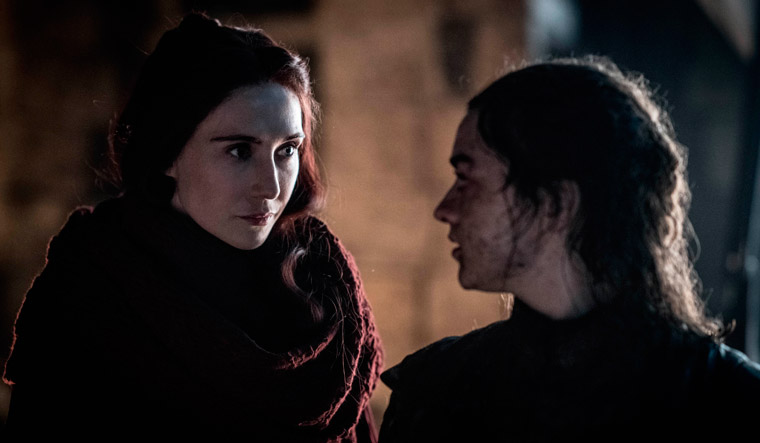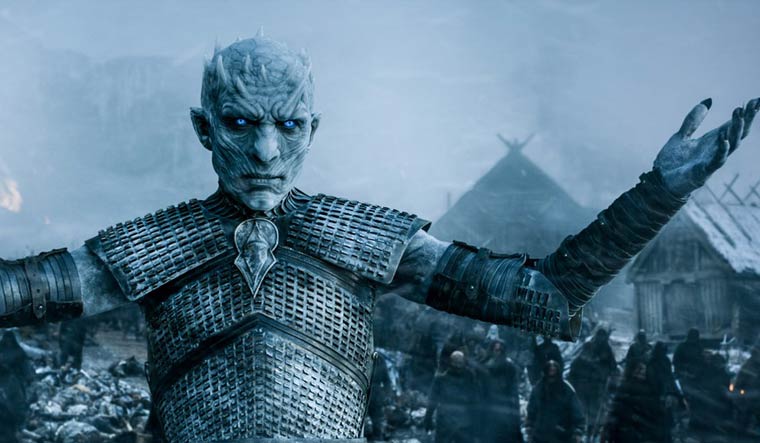The Long Night is over, literally and metaphorically. The third episode titled as aforementioned saw the end to the much anticipated Long Night with the death of the Night King. The episode was undoubtedly the darkest (a bit too much), longest and the most stressful war to be ever showcased on television. It did have the death of some loyal characters of the show―yet there was a sort of poetic essence to it. All the ones who died in this episode died fighting, defending or protecting thereby bringing a sense of honour to their own death. Alas, a moment of silence for all the houses that got swept under the snows, a special mention to the small and proud house―Mormont.
Eventfully, in this episode the Night King was stabbed brutally by No One. The conversation between Arya and Melisandre resurfaced with the Night King’s death, as it was foreshadowed earlier in a prophecy related to the colour of the villain’s eyes. Arya sneaking up behind the Night King’s generals and plunging a knife into him after she repeated to Melisandre her mantra―‘Not Today’―was an epic plot twist. The Hound saving or rather lifting Arya from death and Beric finally dying (for sure this time) to save the young Stark was all well-placed in a beautiful thread that foresaw the chances of Arya being the final killer. Yet, it lacked something. Hyped to unimaginable extends since the first delivery of the dialogue ‘Winter is Coming’, the Night King and the winter he brought along has always been an area of interest for GoT fans. While the Night King died, along with him crumbled years and years of speculations, umpteen theories and alas the possibility that the Night King was after something that wasn’t pure evil.
 Carice Van Houten as Melisandre or the Red Woman and Maisie Williams as Arya Stark (right) in Game of Thrones | HBO via AP
Carice Van Houten as Melisandre or the Red Woman and Maisie Williams as Arya Stark (right) in Game of Thrones | HBO via AP
We have had theories that have since the beginning tried to understand the Night King’s ultimate goal. At a point, the theories said that the Night King was after Bran or little Sam or even a Stark. From what the Night King is after to who exactly he is, we’ve escalated to theories that Bran or Jon is the Night King, or maybe that he is a Stark whose Night Queen is in the crypts. But now we have the Night King, who is a stereotypical villain that lacks any ulterior motive other than one to kill all. He is not essentially after anything but death. Moreover, his death left a lot of things unsaid; from the Azor Ahai prophecy to why he couldn’t be burned by fire (no, let’s not theorise that he’s a Targaryen) there are a lot of things that was simply swept under the rug. But then again are we now to believe that the Azor Ahai is not the one who brings an end to the Winter, but the one who kills Cersei. So are we now placing Cersei above the Night King in the rank of villainous villains?
Yes, Cersei is evil. She can pull off burning the whole of Westeros with wildfire and still be sitting at some end of the world sipping wine with no slight trace of guilt. But that means that she is power hungry or rather hungry for the throne that personifies power. Her reason, be it hiding her relation or protecting her children or procuring the throne, has always been explicitly stated rather than the Night King’s whose evilness we always hoped to be more historically placed. The way the Night King was hyped with the constant reminders that the long night would be the war that mattered, proved to be rather worthless with the whole concept coming to an end, that too without any revelations. Well, maybe the Night King was just an ice zombie all along and maybe, just maybe, we just hyped up his thousand years of existence to mean something more.
Anyhow, Arya stabbing him was the most heroic scene of the episode baring aside that the fact that the Night King deserved an explanation. This would undoubtedly explain the tweets and memes GoT fans are putting out on social media proclaiming that they were quite annoyed with the brief Long Night. Now that the Long Night is over and we move into the ‘Game of Thrones’ again let’s just hope that somewhere along the three remaining episodes we get some truth bombs on the Night King. Just not today!



